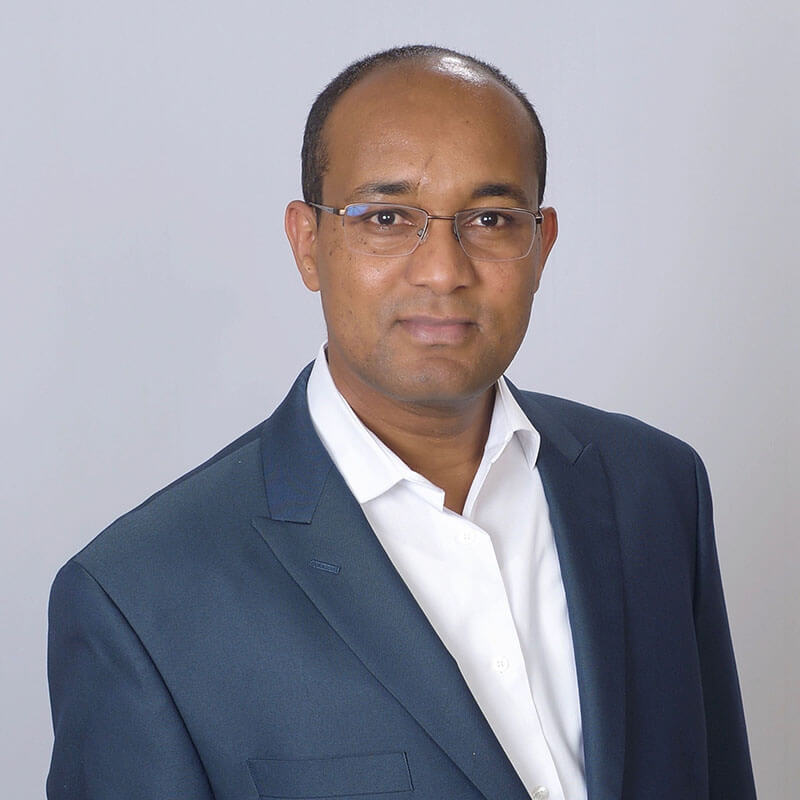Dr. Temesgen Garoma

Associate Dean, Professor, Blasker Chair in ENVE, Director of ENVE Program
Academic Affairs
College of Engineering
Civil, Construction, and Environmental Engineering
SDSU
Primary Email: [email protected]
Phone/Fax
Primary Phone: 619-594-0957
Building/Location
Engineering - 421D
5500 Campanile Drive
San Diego,
California
92124
Website Links
Bio
Dr. Garoma is a Professor in the Department of Civil, Construction and Environmental Engineering. He is the Blasker Chair in Environmental Engineering and the Director of the Environmental Engineering Program. Currently he serves as the Associate Dean for Graduate Studies and Research in the College of Engineering. He completed a Ph.D. degree in Engineering Mechanics (Environmental Engineering) from the Joint Doctoral Program between the University of California, San Diego and San Diego State University in 2004. He received a B.S. degree in Civil Engineering from Addis Ababa University, Ethiopia and an M.S. degree in Geotechnical Engineering from University of Hannover, Germany.
Education
PhD - Environmental Eng., University of California-San Diego and San Diego State University, 2004
MSc - Geotechnical Eng., University of Hannover, 2000
BSc - Civil Eng., Addis Ababa University, 1996
Areas of Specialization
The emphasis of Dr. Garoma’s research is on water and wastewater treatment, resource recovery, and renewable energy. His current research focus is on biofuels production from algal biomass, resource recovery from wastewater and integration of wastewater treatment with energy production. In the past, he served as the principal investigator on several research projects that focused on the application of advanced oxidation processes and the formation of disinfection byproducts during ozonation and chlorination of drinking water and wastewater effluents.
Certifications
Professional Engineer, Registered in State of California
Awards & Honors
2017 World Water Forum, Metropolitan Water District of Southern California
2007-2012 Technical Advisory Committee, San Diego Coast Keeper
2007-2012 Technical Advisory Committee, San Diego Citizen Watershed Monitoring Consortium
2007 American Public Works Association, Central California Chapter
1998-2000 DAAD (German Academic Exchange) Scholarship
Courses
EnvE 356 - Environmental Chemistry for Engineers
EnvE 554 - Process Fundamentals of Environmental Systems
EnvE 645 - Aquatic Chemistry for Environmental Engineers
Research
Novel treatment processes for water and wastewater
Biofuel production
Resources recovery and utilization from waste streams
Seawater desalination
Grants
- Solar Thermal Energy Concentrated with Fresnel Lens for Seawater Desalination, Bureau of Reclamation and Metropolitan Water District of Southern California (Role: PI)
- A New Approach for Seawater Desalination, Metropolitan Water District of Southern California (Role: PI)
- A Novel Water and Energy Saving Strategy – the Use of Secondary Effluent for Algal Biomass Cultivation, Metropolitan Water District of Southern California (Role: PI)
- Energy-efficient and cost-effective microalgae disruption for extraction of lipids for biodiesel production, California Energy Commission (Role: PI; Co-PIs: Drs. Beyene (SDSU) & Balsdon (SDSU)
- Development of next-generation feedstock for biomethane production, California Energy Commission (Role: PI)
- Electroporation of algal biomass to enhance methane gas production, California Energy Commission (Role: PI; Co-PI: Dr. Engin)
- Evaluation of media for storm water treatment, URS Corporation (Role: PI)
- Environmental impact assessment tools, California Energy Commission (Role: Co-PI; PI: Dr. Beyene)
- Formation of halonitromethanes during ozonation of drinking water, Bureau of Reclamation and Metropolitan Water District of Southern California (Role: PI)
- Compressible filters from flexible granular media, Metropolitan Water District of Southern California (Role: PI; Co-PI: Dr. Valdes)
- Enhanced anaerobic digestion: a sanitation and energy recovery technology, Great Challenge Explorations, Bill and Melinda Gates Foundation (Role: PI)
- Significance of sub-therapeutic levels of ciprofloxacin in the environment, San Diego Foundation Science and Technology Blasker (Role: PI)
- Disinfection of secondary effluent using surfactants immobilized on the surfaces of minerals, Metropolitan Water District of Southern California (Role: PI)
- The San Diego watershed ambient water quality monitoring by citizens project, California State Water Resources Control Board (Role: Co-PI; PI: Dr. Badri)
Publications
Yazdi, R.; Garoma, T. 2022. Algal biomass harvesting using low-grade waste heat: The effect of waste heat temperature and air speed on dewatering algal suspension. Biofuels 13 (7), 895-905
Yazdi, R.; Garoma, T. 2022. Algal biomass harvesting using low-grade waste heat: Investigation of dewatering algal suspension by evaporation. Journal of Thermal Science and Engineering Applications 14 (5)
Garoma, T.; Yazdi, R. 2021. Algal Biomass Harvesting Using Low-Grade Waste Heat: Evaluation of Overall Heat Transfer Coefficient in a Heat Exchanger. Journal of Heat Transfer, 143 (1), https://doi.org/10.1115/1.4048473
Kinger, R; Garoma, T. 2021. Ultrasound processing of Chlorella vulgaris and a novel functional classification of power ultrasound test systems. Biofuels https://doi.org/10.1080/17597269.2018.1496386
Garoma, T.; Yazdi, R., Chin, C., Jain, A. 2019. Chlorella vulgaris cell disruption using copper sulfate. Biofuels, https://doi.org/10.1080/17597269.2019.1573604
Garoma, T.; Yazdi, R. 2019. Investigation of the disruption of algal biomass with chlorine. BMC Plant Biology, 19:18, https://doi.org/10.1186/s12870-018-1614-9
Kinger, R; Garoma, T. 2018. Growth media selection: the relationship between growth medium used for microalgal cultivation and the susceptibility of cells to disruption by low frequency power ultrasound. Journal of Energy Resources Technology doi: 10.1115/1.4041090
Garoma, T.; Pappaterra, D. 2018. An investigation of ultrasound effect on digestate solubilization and methane yield. Waste Management 71, 728-733
